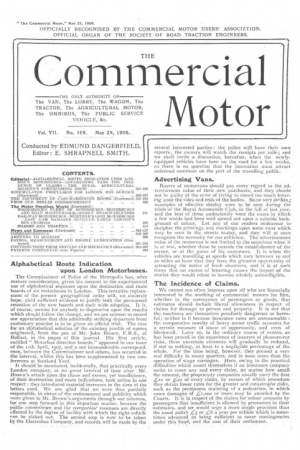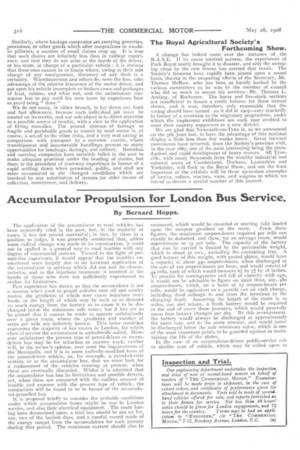Alphabetical Route Indication upon London Motorbuses.
Page 1

Page 2

If you've noticed an error in this article please click here to report it so we can fix it.
The Commissioner of Police of the Metropolis has, after mature consideration, given his consent to the experimental use of alphabetical sequence upon the destination and route boards of six motorbuses in London. This tentative replacement of the present geographical order will, we sincerely hope, yield sufficient evidence to justify both the permanent retention of the new boards and their wide adoption. It is, of course, unwise for anybody to dogmatise upon the results which should follow the change, and we are content to record our appreciation that this admittedly striking departure from customary practice is to be given an official trial. The case For an alphabetical solution of the existing jumble of names originated, from the pen of Mr. John Brown, of Belfast, in the pages of this journal. His first article, entitled " Motorbus direction boards," appeared in our issue of the iith April, 1907, and a not inconsiderable correspondence, between the Commissioner and others, has occurred in the interval, whilst this has been supplemented by two conferences at Scotland Yard.
It should be mentioned, incidentally, that practically every London company, at no great interval of time .after Mr. Brown's attack upon the chaos and excess, yet insufficiency, of their destination and route indications, took action in one respect : they introduced material increases in the sizes of the letters used. We are glad that we were thus partially responsible, in virtue of the endorsement and publicity which were given to Mr. Brown's arguments through our columns, for one step forward in this important matter, because the public convenience and the companies' revenues are directly affected by the degree of facility with which the right vehicle "an be picked out. The second step is now to be taken by the Electrobus Company, and record S will be made by the several interested parties : the police will have their own reports; the owners will watch the receipts per mile; and we shall invite a discussion, hereafter, when the newlyequipped vehicles have been on the road for a few weeks, as there is no question that the innovation must attract universal comment on the part of the travelling public.
Advertising Vans.
Buyers of inotoryans should pay every regard to the advertisement value of their new purchases, and they should not be guilty of the error of trying to crowd too much lettering upon the sides and ends of the bodies. Some very striking examples of effective display were to be seen during the trials of the Royal Automobile Club, in the fall of last year, and the best of these undoubtedly were the cases in which a few words had been well spread out upon a suitable back
ground of colour. Let any of our readers endeavour to decipher the printings and markings upon some vans which
may be seen in the streets to-day, and they will at once recognise the necessity for our criticism. The advertisement value of the mato/a/an is not limited to the occasions when it is at rest, whether these be outside the establishment of the: owner, or at the gates of his. customers. It is when the vehicles are travelling at speeds which vary between TO and 20 miles an hour that they have the greatest opportunity of attracting the notice of fresh observers, and it is at such times that an excess of lettering causes the import of the stories they would relate to become wholely
The Incidence of Claims.
We cannot too often impress upon all who are financially interested in the working of commercial motors for hire, whether in the conveyance of passengers or goods, that estimates should include liberal allowances in respect of claims for damage to person and property. It is not that the machines are themselves peculiarly dangerous or harm• ful; neither is it because insurance rates are unreasonable : the comparative novelty of heavy motor traffic accounts for a certain measure of abuse of 'opportunity, and even of blackmail. Later on, in the ordinary course of events, as has been proved in the experience of insurers of pleasure-car risks, these uncertain elements will gradually be reduced, if not to nothing, at least to a negligible percentage of the whole. For the time being, however, they present a very real difficulty in many quarters, and in-none more than the operation of stage carriages. Here, owing to the practical difficulties which assert themselves if an insurance company seeks to cover any and every claim, no matter how small • the amount, the proprietary companies usually carry the first 4-io or of every claim, by reason of which procedure they obtain lower rates for the greater and catastrophe risks, such as the permanent maiming of a pedestrian, in which cases damages of ,‘T,000 or more may be awarded by the Courts: It is in -respect of the claims for 'minor amounts by passengers that insufficient is allowed by promoters in their , estimates, and we would urge a more ample provision than the usual paltry or £6 a year per vehicle which is sometimes. advanced as being Sufficient to cover contingencies . under this head, and the cost of their settlement.
Similarly, where haulage companies arc carrying groceries, provisions, or other goods which offer temptations to wouldbe pilferers, a number of small claims crop up. It is true that such claims are infinitely less than in railway experience, and that they do not arise at the hands of the driver, or his mate, in charge of a particular vehicle : it is obvious that these men cannot be to blame where, owing to their sole charge of any consignment, discovery of any theft is a certainty. Warehousemen and others do, none the less, take advantage of the relative innocence of the motor driver, and put upon his vehicle incomplete or broken cases and packages of fruit, raisins, and what not, and the unfortunate contractor has to pay until his men learn by experience how to avoid being" clone_" We do not essay, in either branch, to lay down any hard and fast allowance, because each individual job must be treated on its merits, and our sole object is to direct attention to a possible source of trouble, with a view to the application of fitting remedies. The proved absence of damage to .fragile and perishable goods in transit by road motor is, of .course, a set-off to the other risks, and a very real saving in comparison with transport by a common carrier, where transhipment and innumerable handlings present so many .opportunities for breakage, damage, and robbery. Motorbus and carrying companies have certainly failed in the past to make adequate provision under the heading of claims, but there is the precedent of tramway experience in favour of a rapid settling down when personnel, public, and staff are more accustomed to the changed conditions which are involved by any substitution of motors for older means of collection, conveyance, and delivery.
The Royal Agricultural Society's Forthcoming Show.
A change has indeed come over the fortunes of the R.A.S.E. If its cause merited success, the experiment of Park Royal nearly brought it to disaster, and only the sweeping clean by the new broom has averted that result. The Society's finances have rapidly been placed upon a sound basis, thanks to the unsparing efforts of the Secretary, Mr. Thomas McRow, who has been as loyally backed by the various committees as he was by the member of council who did so much to secure his services—Mr. Thomas L. Aveling, of Rochester. The horse and live-stock sections are insufficient to insure a credit balance for these annual shows, and it was, therefore, only reasonable that the voting should have turned—as it did in 5905—very markedly in favour of a reversion to the migratory programme, under which the implement exhibitorsare each year enabled to meet their country supporters in a new district.
We are glad that Newcastle-on-Tyne is, as we announced on the 7th June last, to have the advantage of this national display a little less than five weeks hence. Great forward movements have occurred, since the Society's previous visit, in the year 1887, one of the most interesting being the introduction and rapid development of heavy motors. All Tyneside, with many thousands from the wealthy industrial and mineral areas of Cumberland, Durham, Lancashire and Yorkshire, will flock to the Royal Show, and not the least important of the exhibits will be those up-to-date examples of lorries, rollers, tractors, vans, and wagons to which we intend to devote a special number of this journal.




















